

Nietzsche on How to Find Yourself and the True Value of Education. “Do you have the courage to bring forth the treasures that are hidden within you?”
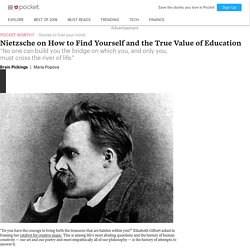
Elizabeth Gilbert asked in framing her catalyst for creative magic. This is among life’s most abiding questions and the history of human creativity — our art and our poetry and most empathically all of our philosophy — is the history of attempts to answer it. Friedrich Nietzsche (October 15, 1844–August 25, 1900), who believed that embracing difficulty is essential for a fulfilling life, considered the journey of self-discovery one of the greatest and most fertile existential difficulties. Cheerfulness cannot be compulsory, whatever the T-shirts say. I once ended up at a Boy Scout ceremony in the northeast United States, where I inhaled the American spirit unfiltered.

The boys’ uniforms had Stars-and-Stripes patches sewn on next to their badges. We recited the Pledge of Allegiance in front of an oversize US flag, and we prayed to America’s vague God, giving thanks for this and that, and asking for some strength or protection. Julian Savulescu: The Philosopher Who Says We Should Play God.
Leo Tolstoy on Finding Meaning in a Meaningless World - Brain Pickings - Pocket. Shortly after turning fifty, Leo Tolstoy (September 9, 1828–November 10, 1910) succumbed to a profound spiritual crisis.
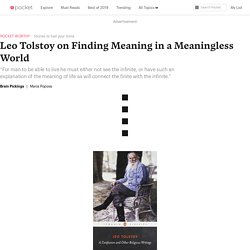
With his greatest works behind him, he found his sense of purpose dwindling as his celebrity and public acclaim billowed, sinking into a state of deep depression and melancholia despite having a large estate, good health for his age, a wife who had born him fourteen children, and the promise of eternal literary fame. On the brink of suicide, he made one last grasp at light amidst the darkness of his existence, turning to the world’s great religious and philosophical traditions for answers to the age-old question regarding the meaning of life.
He likens the progression of his depression to a serious physical illness — a parallel modern science is rendering increasingly appropriate. Tolstoy writes: Then occurred what happens to everyone sickening with a mortal internal disease. Philosophers Name the Best Philosophy Books: From Stoicism and Existentialism, to Metaphysics & Ethics for Artificial Intelligence. As an English major undergrad in the 90s, I had a keen side interest in reading philosophy of all kinds.

Before the canon: the non-European women who founded philosophy. Culture - Good Grief!: The beguiling philosophy of Peanuts. When I was growing up in the middle of nowhere in western Canada, I loved Charles M Schulz’s Peanuts comic strips.
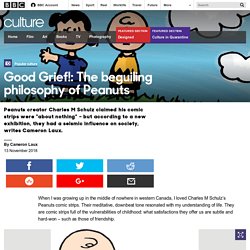
Their meditative, downbeat tone resonated with my understanding of life. They are comic strips full of the vulnerabilities of childhood: what satisfactions they offer us are subtle and hard-won – such as those of friendship. In the nearly 18,000 strips that Schulz drew over 50 years of his career (1950-2000), adults almost never appear, and when they do they are abstracted as legs. How To Be Productive According To Ancient Philosophy. Improving productivity has been a pursuit of the modern human being from the start of civilization.
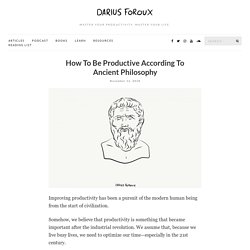
Somehow, we believe that productivity is something that became important after the industrial revolution. We assume that, because we live busy lives, we need to optimize our time—especially in the 21st century. That’s not true. Productivity has been a topic of discussion ever since ancient eastern and western philosophy started. It’s a universal theme. There be monsters: from cabinets of curiosity to demons within. In 2003, a team of scientists in China managed to create embryos containing a mix of rabbit and human DNA.

Most of the biological matter was human, while the rabbit DNA was present only in the mitochondria, the energy-generators of the cells. The aim was to try to find new ways of growing and harvesting the stem cells present in early human development, which were (and are) a promising avenue for medical study and treatment. It wasn’t long, however, before controversy erupted over these so-called ‘chimeras’, as they were dubbed by some researchers. Wabi-Sabi: The Japanese Philosophy For a Perfectly Imperfect Life. Life is unpredictable.

And that’s okay. Embrace it. When nothing is certain, everything is possible! Your plans for tomorrow, next month or next year may not unfold as you expect. But it’s important to make plans and move on. Why You Can’t Remember Being a Kid. Perspective in the Age of Opinion: Timely Wisdom from a Century Ago. A philosopher explains how our addiction to stories keeps us from understanding history. “I myself am a victim to narrative,” says Alex Rosenberg, a Duke University philosophy professor whose new book hopes to convince readers that narratives — and especially narrative history — are flawed as tools of knowledge.
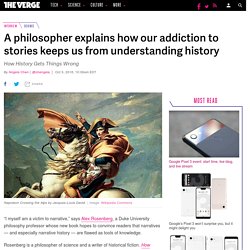
Rosenberg is a philosopher of science and a writer of historical fiction. How History Gets Things Wrong: The Neuroscience of Our Addiction to Stories, out this week from MIT Press, does not deny that stories can be wonderful as art and effective at eliciting emotions that then push action. But, Rosenberg tells The Verge, stories also lull us into a false sense of knowledge and fundamentally limit our understanding of the world. This interview has been lightly edited for clarity. About time: why western philosophy can only teach us so much. One of the great unexplained wonders of human history is that written philosophy first flowered entirely separately in different parts of the globe at more or less the same time.
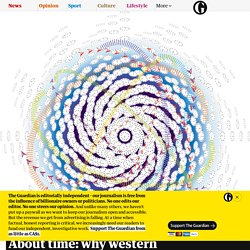
The origins of Indian, Chinese and ancient Greek philosophy, as well as Buddhism, can all be traced back to a period of roughly 300 years, beginning in the 8th century BC. These early philosophies have shaped the different ways people worship, live and think about the big questions that concern us all. Nietzsche’s Guide to Better Living. In 1889, Nietzsche suffered the dramatic breakdown that would debilitate him until his death 11 years later: Upon catching sight of a man flogging a horse in a public square in Turin, the story goes, he threw his arms around the animal’s neck, burst into tears, and crumpled to the ground. He had already displayed signs of volatility before this collapse. According to Kaag, Nietzsche “began to sign his letters ‘Dionysus’ ” in 1888, and he had a troubled relationship with food throughout his life, ricocheting from one extreme diet to the next.
The Case for Not Being Born. David Benatar may be the world’s most pessimistic philosopher. An “anti-natalist,” he believes that life is so bad, so painful, that human beings should stop having children for reasons of compassion. “While good people go to great lengths to spare their children from suffering, few of them seem to notice that the one (and only) guaranteed way to prevent all the suffering of their children is not to bring those children into existence in the first place,” he writes, in a 2006 book called “Better Never to Have Been: The Harm of Coming Into Existence.” In Benatar’s view, reproducing is intrinsically cruel and irresponsible—not just because a horrible fate can befall anyone, but because life itself is “permeated by badness.”
Why Are Hundreds of Harvard Students Studying Ancient Chinese Philosophy? The Great Philosophers 8: Theodor Adorno. How to Find Your Life Purpose? Escape Your Bubble. WiseGEEK clear answers for common questions.url. Quote by Socrates: “Our youth now love luxury. They have bad manner...” The Great Philosophers 3: Epicurus. The Ancient Greek philosopher Epicurus was born in 341 BC, on the island of Samos, a few miles off the coast of modern Turkey.
Melissa Lane on Plato. How to Find Your Purpose and Do What You Love. Marxism.